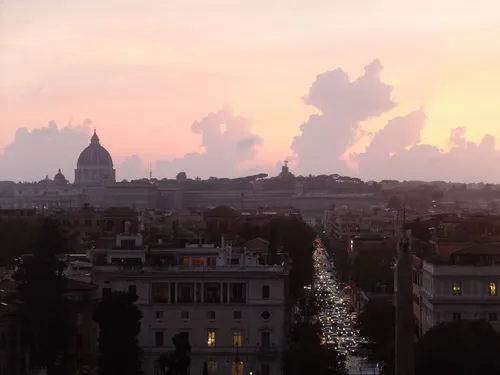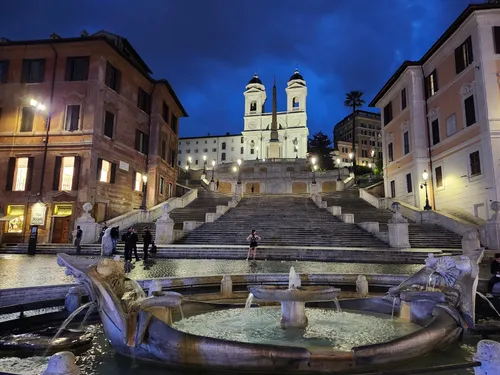Maria attended third and fourth grade at Pinetamare Elementary outside Naples 1974 through 1976, while I was there from 1980 to 1982, first grade and second. Her mother, Eleanora Romano, was a devoted volunteer who chaperoned countless activities including field days and field trips to Carney Park, Caserta Palace and, on one special weekend during the bicentennial, Rome. It was Luchino Romano, Maria’s father, who suggested the time capsule at the end of the school year summer 1975. Enthusiastically agreed upon, the capsule was put away in the playground behind the school where students enjoyed PE. All sixteen in Maria’s class participated, lining up single file to add their keepsakes into the simple, wooden chest Mrs Romano had bought at a pawn shop in Sorrento for the occasion. When Pinetamare closed in 1997, it was rumored that someone, possibly Commendatore Romano himself, unearthed and moved it to Rome, though careful to leave its contents safely sealed. Maria told me all this many years later.
Maria and I met at Walter Reed Medical Center in 2012. Her father was receiving treatments and I was front office supervisor at Fisher House, where the two stayed three months. Mrs Romana had already passed some years before. Our friendship was cemented upon the discovery we had both attended the same school, blossoming in 2015 when I first traveled to Rome on my own and, instantly taking the eternal city to heart, returned to nearly every year after. Maria worked IT at the American University in Trastevere, and we met on every one of my trips either for lunch or dinner, sometimes with, sometimes without Mr Romano. By this time the Commendatore was rather old and moved about with some difficulty. But he had a lovely spirit and told the most fascinating stories. On one of my Roman sojourns, I had rented an apartment on Via Sistina just blocks from the Spanish Steps. Back in the day, the Commendatore said, the strada was loaded with brothels, including one where he dispelled his virginity to a teenage tart named Chiara. Dispelled, he added salaciously, “with extreme prejudice.” Over another get together I lamented the fact that the fabled Via Veneto appeared dead. The Commendatore regaled me with a tale of buying Gina Lollobrigida a prosecco once at Harry’s. They had even shared a dance. The reason she accepted was because he was in uniform and not, in his words, “charm incarnate.” Even though Miss Lollobrigida was an Italian goddess, the Commendatore said if push came to shove he preferred Chiara. In later trips, especially after Covid, he became unable to attend our reunions, though he always sent his fondest hopes and wishes. The Commendatore died winter 2024.
Maria told me about the time capsule when I hit Rome this past March. We saluted her father’s memory over dinner at Rosati where she often became emotional. Old school, Maria wore a solemn black band on her left arm. “Do you remember my father mentioning a woman named Chiara?” she asked over rounds of verdicchio. I did. “I received a beautiful note from her some weeks after dad passed. She had something of his she wanted to give me.”
“What?” I asked, intrigued.
The story of the capsule was thus relayed. Maria had left a 45 of “You’re the First, the Last, My Everything” by Barry White. A present from the Commendatore, he took great pleasure singing it to and dancing with her when she was young. These sessions had remained among her strongest, happiest memories. Evidently, Maria’s classmates were encouraged not to divulge what they were leaving for posterity. She had not told a soul until now. After an invitation to tea, a shocked Maria had picked up the grubby box from eighty one year old Chiara at her apartment a few blocks from the Quirinale. The Commendatore and Chiara had kept in touch sporadically over the years, but engaged more frequently during his widowhood. As Chiara had safeguarded his youthful, sexual peccadilloes for ages, the Commendatore trusted her preserving the capsule. Up to a point anyway. He held on to the key himself.
“Its in my office,” Maria said. “I didn’t have the heart to open it by myself. Would you like to meet after I finish work domani and take a gander at it?”
I was all for it.
Maria and I met at Tonnarello early in the evening. The restaurant wasn’t very full, mainly students and a few hip, young Romans, yet she requested seating as far from everyone as possible. Maria lay the capsule on the table, then produced a spotty envelop from her handbag and removed a key from it. “For my childhood,” she said with quiet pomp. “For my third grade friends who I sadly have no contact with. For my mother and father.” Maria unlatched the lock, sighed with anticipation, and gingerly opened the old chest. Without looking, she reached inside and removed an item from it.
We were left dumbfounded. In her hand was a blu ray copy of Gladiator II.
“What?!” Maria shrieked. She instantly grabbed something else. A red, MAGA 2024 cap.
“What the?” I exclaimed.
Maria frantically dug inside again. A cd of Hurry Up Tomorrow by The Weeknd. Desperate, she took the capsule and dumped the remaining contents on the table, a few falling forcefully to the floor. I hastily reached down and produced a weathered copy of My Roman Year by Andre Aciman. Maria rifled through the contents on the table. A banner in the national colors with JUBILEE 2025 printed on it.
“I don’t understand,” I said.
Maria was completely befuddled. She removed her cell from her handbag and, giving it a few taps, held it to her ear. She shook her head, trying again. “Nothing,” she said. “It says the number’s no longer in service.”
I picked the last remaining items off the floor. A postcard of Gina Lollobrigida was one. Scrolled on the back appeared to be an address. I handed it to Maria.
“This is Chiara’s address!” she said. She fervently threw everything back into the capsule. We left Tonnarello and took a taxi post haste to the Quirinale, spouting off ridiculous theories about what we had discovered. We arrived twenty anxious minutes later. Maria buzzed Chiara’s apartment. Nothing. Waiting several minutes until someone left the building, we entered and, skipping the lift, walked briskly up to the third floor. Maria froze. “This is the apartment,” she said with dread. The door was slightly ajar.
Maria knocked and bellowed “Ciao!” and “Signora Chiara!” several times, before we hesitantly entered.
The apartment was empty. We took turns creeping through the rooms. Niente. Maria shook her head in consternation. We were about to leave when I noticed something on the kitchen counter. “Maria,” I called out. We went over in unison and simultaneously gazed upon the smooth countenance of Barry White. “Oh my God,” she said softly. It was her old 45. She delicately took out the record and, inspecting the vinyl, read the songwriting credits absently to herself. She wiped the vinyl with her blouse, then held the record against her chest.
Something else was hidden inside the cover. Maria pulled out two photographs. Inspecting them in silence, her eyes welled with tears. Hand shaking slightly, she lay them on the counter and, pressing her head against the refrigerator, continued softly sobbing. I picked them up. One was a faded color picture of a woman and young girl in 70s dress, arms around each other smiling lovingly, in what appeared to be the gardens at Caserta Palace. The other was a black and white shot of a young man, handsome and unsmiling, standing in front of the Spanish Steps. 1964 was scribbled on the right hand corner in the back.
“Are these?” I whispered.
Maria solemnly nodded and, streaming tears, broke into a smile.





This story has not been rated yet. Login to review this story.